- News
- Reviews
- Bikes
- Components
- Bar tape & grips
- Bottom brackets
- Brake & gear cables
- Brake & STI levers
- Brake pads & spares
- Brakes
- Cassettes & freewheels
- Chains
- Chainsets & chainrings
- Derailleurs - front
- Derailleurs - rear
- Forks
- Gear levers & shifters
- Groupsets
- Handlebars & extensions
- Headsets
- Hubs
- Inner tubes
- Pedals
- Quick releases & skewers
- Saddles
- Seatposts
- Stems
- Wheels
- Tyres
- Tubeless valves
- Accessories
- Accessories - misc
- Computer mounts
- Bags
- Bar ends
- Bike bags & cases
- Bottle cages
- Bottles
- Cameras
- Car racks
- Child seats
- Computers
- Glasses
- GPS units
- Helmets
- Lights - front
- Lights - rear
- Lights - sets
- Locks
- Mirrors
- Mudguards
- Racks
- Pumps & CO2 inflators
- Puncture kits
- Reflectives
- Smart watches
- Stands and racks
- Trailers
- Clothing
- Health, fitness and nutrition
- Tools and workshop
- Miscellaneous
- Buyers Guides
- Features
- Forum
- Recommends
- Podcast
review
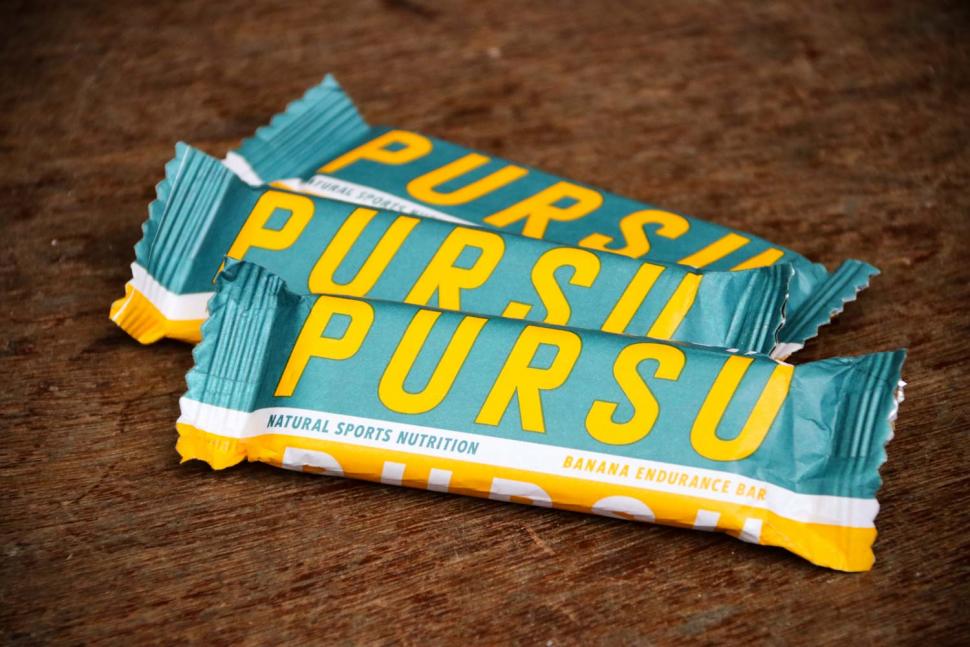 Pursu Banana Endurance Bar
Pursu Banana Endurance Bar£28.50
VERDICT:
A tasty and nutritionally balanced bar with an ethical and environmental conscience that's great for longer days out
Weight:
768g
Contact:
At road.cc every product is thoroughly tested for as long as it takes to get a proper insight into how well it works. Our reviewers are experienced cyclists that we trust to be objective. While we strive to ensure that opinions expressed are backed up by facts, reviews are by their nature an informed opinion, not a definitive verdict. We don't intentionally try to break anything (except locks) but we do try to look for weak points in any design. The overall score is not just an average of the other scores: it reflects both a product's function and value – with value determined by how a product compares with items of similar spec, quality, and price.
What the road.cc scores meanGood scores are more common than bad, because fortunately good products are more common than bad.
- Exceptional
- Excellent
- Very Good
- Good
- Quite good
- Average
- Not so good
- Poor
- Bad
- Appalling
Pursu's Endurance Bars are a tasty, moist wholefood bar with an ethical conscience. Being quite high in fat and protein, they make great slow-release fuel for long days on the bike.
- Pros: All-natural and vegan, compostable wrappers, nice taste and texture
- Cons: Not the biggest carbohydrate bang for your buck, wrapper is a little 'flakey'
Pursu is a new nutrition brand from West London that goes 'the extra mile to source the best naturally nutritious ingredients and are mindful of the inspiring environment in which we love to ride'. The bars are vegan, with no added sugar, and to keep the manufacturing process as clean and unadulterated they're cold pressed. So no nasties, no weird manufacturing process, just proper food.
It's a really nice touch and sign of the brand going that bit further that the packaging is bio-based and home-compostable – meaning that when you get home and empty your pockets of the wrappers (because you DON'T throw them into the ditch as you ride), you can put the bars back into nature. Adding to the ethical and sustainable touch, each sale makes a small contribution to the 'Re-cycle' charity that ships old donated bikes to those without transport in Africa.
Flavours
Three flavours of bar are available: Banana and Cacao, Sour Cherry and Almond, and Beetroot and Date. The banana bar, as you'd expect, was a winner – a failsafe choice for sports products and, as you'd expect, this delivers. It's not overly banana-y, though you can taste it. It's more a generic sweetness, but with a nice bitter element thanks to the addition of a bit of cacao, which prevents the bar being overly sweet.
The Cherry and Almond is perhaps my favourite – with slight reminiscences of one of my go-to cake choices when available, the Bakewell tart. It's a light and fresh taste that's zingy and tangy without being over-bitter.
And last but not least, the perhaps controversial beetroot. I like beetroot, but appreciate some are a bit unsure of the purple powerhouse. This bar is definitely worth a try for the believers and non-believers, however. It retains that earthy, robust flavour of a beet, but the dates keep it sweet and juicy, and the cashews and sunflower seeds give a bit of crunch and texture. It's a savoury bar, but not overly so. The first time I tried it I was a bit unsure, but when I went back for a second go I liked it more. It's a grower for sure.
The texture is great for eating on the move – the bars hold together well once opened, and have a nice soft chewiness to them, with a very small element of crunch. They're moist and easy to get down on the move, and don't crumble as you bite some off and then chew – something that can be a choking hazard and can leave your jersey pockets looking like a bowl of muesli if you eat half then stash the rest for later.
The packaging is nice and easy to get into on the move. They rip quite easily, but they can also flake up quite easily, leaving you accidentally dropping small scraps on the road. Sure, it's compostable, but it's not great to be leaving mess lying about.
Fuel delivery
Nutritionally, the bars pack a reasonable punch, though as is typical of more natural bars, a lot of the calories are weighted towards protein and fat rather than carbs. Each flavour has slightly different macros, but each works out at around 200 calories, with 20-25g carbohydrate, 5g protein, and 9g fat. It's important to note nearly all of these fats are the 'good' unsaturated kind, resulting from the inclusion of nuts and seeds in the bars, and this is a great fuel source for longer lower-intensity rides.
Most other energy bars stack up with similar nutrition breakdowns, though there tends to be more of a leaning towards carbohydrate – a result of the inclusion of 'unnatural' additions such as maltodextrin. The slightly lower carb content of a Pursu bar means they're not really what you'd want before a set of top-end intervals or a race, where quick carbs are the answer – you'd likely be reaching for gels or blocks.
> How to eat right for sportives and long rides
I used the bars on three rides, two of which were long and steady tippy-tappy types and they kept me going well – the heavier fat and protein content gives a good source of slow-burn fuel. I also used them on a shorter session with a load of intervals in it – and though this could be a result of all sorts of other factors, I felt a bit out of gas at the end. Maybe it was due to the intensity of the session, not eating enough before, or the lower carbohydrate content of the bar. Who knows? But I do think that given the way the calories stack up, Pursu is best for endurance rather than intensity – they are called 'Endurance bars' after all.
Value
The bars are sold in packs of 16, with a pack costing £28.50 – that's £1.78 each. Compared to others, that's a fair bit cheaper than what could be deemed the market-leading choice for natural nutrition, the Veloforte, which cost around £2.33 each when purchased as a three pack, and more or less the same as a Torq Chew bar, another cold-pressed option. Torq's bars are £1.85 each.
Overall, I enjoyed these a lot and really admire the ethical and sustainable stance taken by Pursu. For steady endurance rides they're great, and those long days in the saddle will give you plenty of time to get used to the initially unusual beetroot flavour! Just make sure you don't drop little bits of the wrapper as you ride...
Verdict
A tasty and nutritionally balanced bar with an ethical and environmental conscience that's great for longer days out
road.cc test report
Make and model: Pursu Banana Endurance Bar (16 pack)
Size tested: 16 x 48g bars
Tell us what the product is for and who it's aimed at. What do the manufacturers say about it? How does that compare to your own feelings about it?
PURSU makes 'natural sports nutrition for those in pursuit of better'. They're designed for use before, during or after training and are 100% natural and vegan.
It says, "The Pursu range of vegan endurance bars are made from natural ingredients with absolutely no added sugar. They're cold pressed and deliciously moist which makes them easy to eat, even while training.
"Sustainability is at the core of our ethos and we're mindful of looking after our wonderful environment. We use bio-based home compostable packaging that will break down into compost and return to nature and we're proud to be a plastic free brand."
Tell us some more about the technical aspects of the product?
Each bar is described as:
No added sugar
Vegan friendly
100% natural
Rate the product for quality of construction:
7/10
The texture is chewy but with a bit of crunch, and the bars stay together well and don't crumble in your pocket if you're a nibbler rather than an 'eat all in one' kinda rider.
Rate the product for performance:
8/10
For a long steady ride, they were great, I had three over a four-hour ride and felt well fuelled throughout, with the slower-release fat and protein elements keeping me satiated throughout. I wouldn't want to try them before a more intense ride, though, as the lower carb content probably isn't quite right for that type of workout.
I enjoyed all the flavours, particularly the cherry and almond. I imagine the beetroot may divide opinion however.
Rate the product for value:
6/10
The bars come in multi-packs of 16, costing £28.50 – or £1.78 each. This is about standard for energy bars nowadays. They're cheaper than the exceedingly popular Veloforte – another product that focuses on being natural and unprocessed. Most bars on the market seem to work out at the £1.60-£2 range though.
Tell us how the product performed overall when used for its designed purpose
As mentioned above, for long and steady endurance rides the bars are great.
Tell us what you particularly liked about the product
I enjoyed the texture, which is easy to eat on the move, and the packaging is easy to get into with your teeth if you're keeping one hand on the bars as you open it. The flavours are also good, and there's a nice variety.
Tell us what you particularly disliked about the product
There wasn't a huge amount I didn't enjoy to be honest... The beetroot flavour takes a little getting used to, and the wrapping is a bit 'flakey' so you need to be careful not to drop little fragments in the road.
How does the price compare to that of similar products in the market, including ones recently tested on road.cc?
See above regards value. They're cheap compared to a Veloforte (£2.33 each) but on a par with most similar bars, for example the Torq Chew (£1.85 each).
Did you enjoy using the product? Yes
Would you consider buying the product? Yes
Would you recommend the product to a friend? Yes
Use this box to explain your overall score
They're really nice. They taste nice, have a good texture for eating on the move, and Pursu has a strong ethical stance. Just watch out for dropping the packaging, and stick to using them on lower-intensity endurance rides rather than races or interval sessions.
About the tester
Age: 31
I usually ride: Giant TCR / Cannondale Supersix My best bike is: Giant TCR
I've been riding for: 5-10 years I ride: Every day I would class myself as: Expert
I regularly do the following types of riding: road racing, club rides, sportives, general fitness riding
Latest Comments
- pockstone 13 min 21 sec ago
Remind me...what day is it????
- Natrix 22 min 33 sec ago
Grass snakes (which are green with a yellow band - like the lock) often emit the odour of rotting flesh if disturbed, along with acting dead, in...
- slc 27 min 27 sec ago
That is pretty staggering. The other sixth must have been somewhere else.
- David9694 31 min 5 sec ago
Notwithstanding its collapsing circulation, I still get it quoted to me as a source of news and information in my local Comments section. If I...
- OldRidgeback 41 min 16 sec ago
Using superglue anywhere on the vehicle would be considered as causing damage so that would be an offence. I don't think spreading grease over the...
- hutchdaddy 1 hour 3 min ago
It's clearly a shit car, you won't get your cycle in the back of it and it won't have a CD player.
- essexian 2 hours 21 min ago
Before I had even said this persons home address, my wife said upon hearing the story: "He's from Loggerheads isn't he...."
- Rekrab 11 hours 24 min ago
MORE LANES, MORE LANES!!!!
- Simon E 11 hours 31 min ago
The numbers don't tell anything like the whole story....
- Global Nomad 13 hours 23 min ago
good to see you're testing the farsports wheels - hope to see road.cc continue to expand the range of brands it considers. These or the shallower...
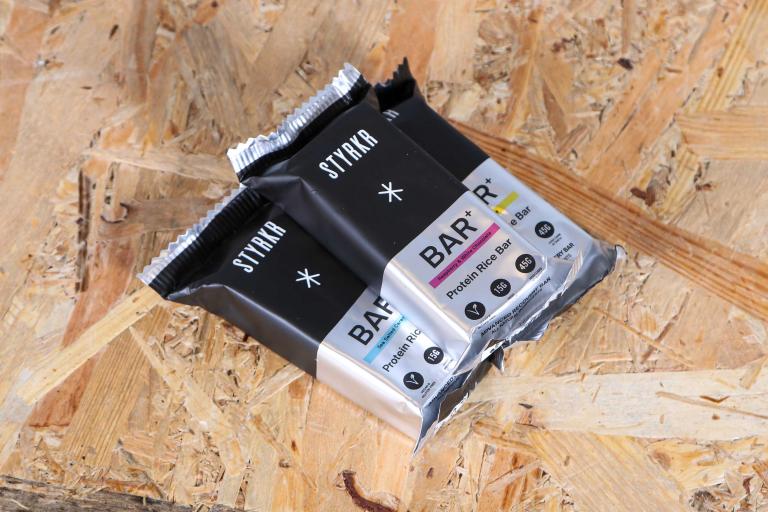
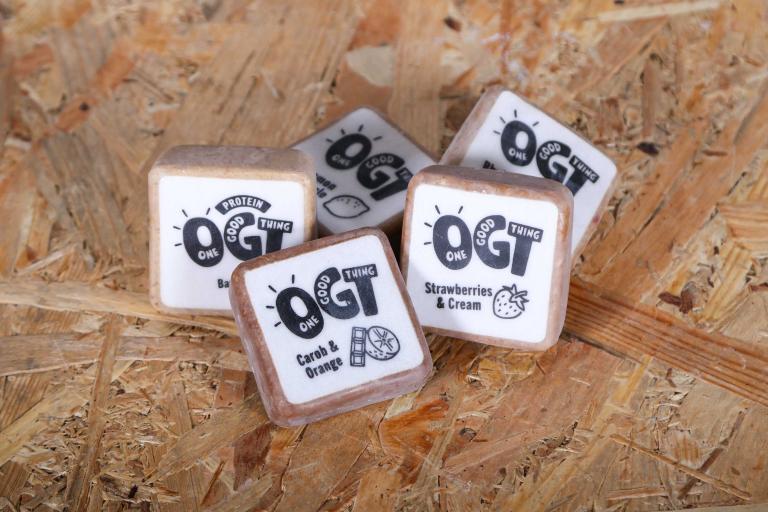
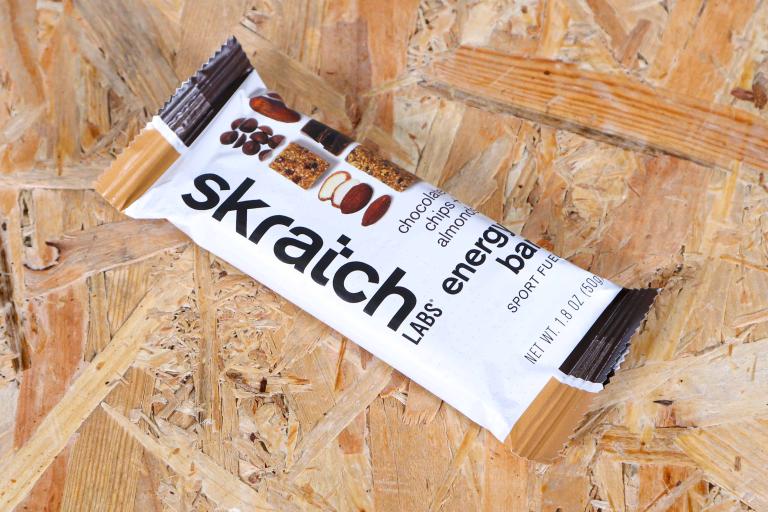
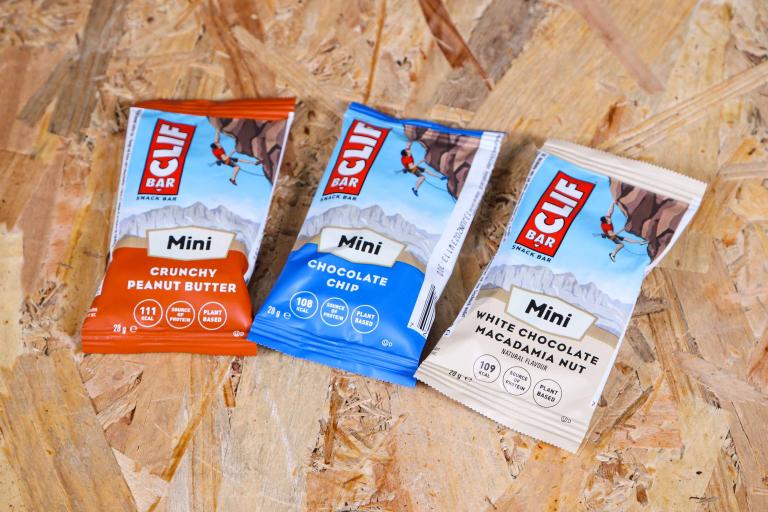
Add new comment
13 comments
I will heartily recommend the "banana guard", the canadian version in mk II for me, but there are now many varients out there. OK, they take up lots of room, but they stop the banana (god of fruit) turning to mush. Then you put the skin back in the guard for the journey home or the nearest bin.
I like making my own flapjacks, not that cheap especially if you like quality dried mango, but I know everything that is going in there. And for something a little less "healthy" homemade brownies.
I've got one of those, in purple, but my lady makes me keep it in the garage, saying it brings back memories of her first husband. Which is funny 'cause I don't remember him as being especially fond of fruit.
Careful kids, acorns are not that good for you, no matter what our squirrely friends might have us believe. The leeching is VERY important, I have seen Ray Mears processing them, and he didn't think it that worthwhile.
Unfortunately, leeches aren’t very plentiful in British oak woodlands. I’d recommend a water based extraction process instead;)
I believe the only blood-sucking leeches in Britain are found either in Romney Marsh or the House of Lords.
It seems that everyone's forgetting about acorns. They are literally just lying on the ground waiting to be picked up and you can make them into delicious brittle if you don't like their natural strong taste:
Acorn brittle recipe
You will need:
100g caster sugar
100g leached, roasted acorns
Method:
Tip the caster sugar into a saucepan over a low heat
The sugar will start to melt, shake the pan ever so slightly as it does
As the sugar starts to clump together it’ll go translucent and then eventually a caramel colour
When it turns dark brown add your acorns and stir gently
Remove from the heat and pour into a baking tray, lined with greaseproof paper
Leave to cool and harden at room temperature
Mmmmmm!
shutterstock_110099348-870x326.jpg
You can buy a kilo of fig rolls in Tesco for £1.80. That's 48g for 8p and they fit nicely into pockets.
That's a bit pricey - I've just eaten a soreen mini banana loaf, and if it was the same size as these bars, not too dissimilar nutrition (although a lot less fat). Yep I know they don't have the biodegradable wrapper, but a) I carry my rubbish home and b) they work out to be 20p each!
Malt loaf is mostly wheat plus a load of other low grade, processed ingredients. That's why they're 20p each, you usually get what you pay for. And the mini ones only provide 98 kcal.
Unless you're in the middle of a hard workout, in which case solids aren't a good idea, a bit of fat is not a bad thing. Much better if it comes from raw almonds and cashews instead of processed palm fat and other gloop.
But neither Pursu or malt loaf is anywhere near as good as a banana for nutrition (around 20p each and already in a biodegradable and compostable wrapper).
At least we get to see a photo of a red squirrel.
wholly agree with this. Bananas and oranges are perfect [1].
But!!! banana skins can take up to two years to biodegrade, so please don't use biodegradability as an excuse to throw them away into the countryside; take them home with you and dispose of them properly. Leave nothing but tyre-prints.
[1] I find that a banana and a couple of oranges stuffed into my shorts often draws admiring glances, no doubt from people who agree with my environmentalist approach.
"naturally nutritious ingredients and are mindful of the inspiring environment in which we love to ride"
Well it's packed full of marketing buzzwords, if nothing else. But apart from the compostable packaging (which gets a big thumbs-up from me) in the real world, what does this actually mean?
Looking at the banana bar, 190 kcal per bar is decent enough but £1.78 would buy lots of bananas and dates.
I always try to ride through forests of banana trees - it's just so inspiring.
squirrelbanana.jpeg
You are quite right with this one. However, where would you store them all when riding? I, for example, don't have any form of luggage capacity on my bikes nor would I wish to start hanging a carrier bag on my bars!